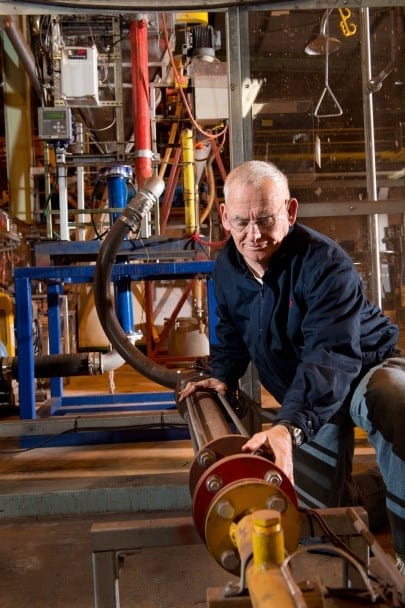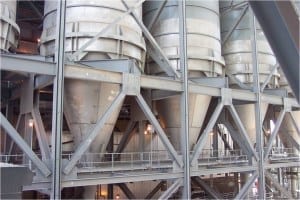Services
TUNRA Bulk Solids offers services for all industries dealing with bulk solid materials. Each year, we complete between 200 and 250 major industrial consultancy projects which cover the entire spectrum of applications related to bulk solids handling, transportation and storage. We are leaders in providing conceptual solutions to any bulk materials related task or problem that may occur in your plant, from fundamental characterisation to development of optimal designs, management processes and technical criteria. Our comprehensive laboratory test facilities and our highly qualified and committed team of engineers and consultants assist you to overcome existing handling problems and to plan new projects to ensure future trouble-free plant operation. Detailed information about the services offered by TBS can be viewed below either by Industry, Material Type or Handling Problem. For further information about a specific service or if you want to make an enquiry, please contact us directly or download our service brochures.-
Services By Handling Problems

Flow Properties Testing
Flow Properties Testing The design of handling and storage facilities requires knowledge of the behaviour and flow properties of the bulk solids under operating conditions. Conditions include loading and consolidation […]

Wear and Attrition Testing
Any mechanical devices which involve the motion of bulk solids relative to surfaces will experience wear problems.
Wear in bulk handling equipment may result from impact or abrasion or, as is often the case, a combination of both. In addition, deterioration of metal surfaces can occur as a result of corrosion

Conveyor Belt and Conveyor Accessories Testing
Belt conveyors play a major role in bulk materials handling operations. They combine versatility and reliability and, in view of their inherent simplicity of operation, they are suited to the conveying of a wide range of bulk materials.
They may be used effectively for the movement of bulk materials over both short and long distances.
In the latter case, the adaptability of their design and construction permits them to operate over undulating terrain.

Hydraulic Conveying
Hydraulic transport of solids has occured since the beginning of time, the flow of fine solid particles in rivers being an easy everyday illustration. Advances in engineering and technology have transformed this natural phenomenon into commercially viable transport systems handling industrial minerals encompassing concentrates, ores and almost every type of tailing via slurry pipelines. TUNRA Bulk Solids offers a range of hydraulic conveying testing and evaluation services.

Pneumatic Conveying Equipment and Testing Services
Aeration systems such as pneumatic conveyors, vertical lifters or air slides are dominated by the air-particle interactions within the pipeline, which are numerous depending on mode of flow.
In dilute or lean systems, this is dominated by lift, drag and collision forces. In dense particle laden flows, the air-particle interactions are much more complex and are largely dependent on the size distribution and density of the conveyed product.

Feeder Optimisation and Design
Feeders control the gravity flow of bulk solids from storage, such as bins or stockpiles, to provide a uniform feedrate to the receiving belt conveyor.
It is vital that the type of feeder be chosen to suit the bulk material being handled and to provide the range of feed rates required. It is also important that feeders be used in conjunction with mass-flow hoppers to ensure both reliable flow and good control over the feeder loads and drive powers. Correct interfacing of feeders and hoppers is essential if performance objectives such uniform draw of material over the whole of the hopper outlet is to be achieved.

Dust (Environmental) Testing
Understanding the dust/moisture relationship of a bulk material allows minimisation of water addition for dust suppression. This in turn assists in water conservation at mines and other handling facilities, as well as minimising the total moisture of the product
-
Services By Industry

Flow Properties Testing
Flow Properties Testing The design of handling and storage facilities requires knowledge of the behaviour and flow properties of the bulk solids under operating conditions. Conditions include loading and consolidation […]

Wear and Attrition Testing
Any mechanical devices which involve the motion of bulk solids relative to surfaces will experience wear problems.
Wear in bulk handling equipment may result from impact or abrasion or, as is often the case, a combination of both. In addition, deterioration of metal surfaces can occur as a result of corrosion

Conveyor Belt and Conveyor Accessories Testing
Belt conveyors play a major role in bulk materials handling operations. They combine versatility and reliability and, in view of their inherent simplicity of operation, they are suited to the conveying of a wide range of bulk materials.
They may be used effectively for the movement of bulk materials over both short and long distances.
In the latter case, the adaptability of their design and construction permits them to operate over undulating terrain.

Hydraulic Conveying
Hydraulic transport of solids has occured since the beginning of time, the flow of fine solid particles in rivers being an easy everyday illustration. Advances in engineering and technology have transformed this natural phenomenon into commercially viable transport systems handling industrial minerals encompassing concentrates, ores and almost every type of tailing via slurry pipelines. TUNRA Bulk Solids offers a range of hydraulic conveying testing and evaluation services.

Pneumatic Conveying Equipment and Testing Services
Aeration systems such as pneumatic conveyors, vertical lifters or air slides are dominated by the air-particle interactions within the pipeline, which are numerous depending on mode of flow.
In dilute or lean systems, this is dominated by lift, drag and collision forces. In dense particle laden flows, the air-particle interactions are much more complex and are largely dependent on the size distribution and density of the conveyed product.

Feeder Optimisation and Design
Feeders control the gravity flow of bulk solids from storage, such as bins or stockpiles, to provide a uniform feedrate to the receiving belt conveyor.
It is vital that the type of feeder be chosen to suit the bulk material being handled and to provide the range of feed rates required. It is also important that feeders be used in conjunction with mass-flow hoppers to ensure both reliable flow and good control over the feeder loads and drive powers. Correct interfacing of feeders and hoppers is essential if performance objectives such uniform draw of material over the whole of the hopper outlet is to be achieved.

Dust (Environmental) Testing
Understanding the dust/moisture relationship of a bulk material allows minimisation of water addition for dust suppression. This in turn assists in water conservation at mines and other handling facilities, as well as minimising the total moisture of the product
-
Services By Material Type

Flow Properties Testing
Flow Properties Testing The design of handling and storage facilities requires knowledge of the behaviour and flow properties of the bulk solids under operating conditions. Conditions include loading and consolidation […]

Wear and Attrition Testing
Any mechanical devices which involve the motion of bulk solids relative to surfaces will experience wear problems.
Wear in bulk handling equipment may result from impact or abrasion or, as is often the case, a combination of both. In addition, deterioration of metal surfaces can occur as a result of corrosion

Conveyor Belt and Conveyor Accessories Testing
Belt conveyors play a major role in bulk materials handling operations. They combine versatility and reliability and, in view of their inherent simplicity of operation, they are suited to the conveying of a wide range of bulk materials.
They may be used effectively for the movement of bulk materials over both short and long distances.
In the latter case, the adaptability of their design and construction permits them to operate over undulating terrain.

Hydraulic Conveying
Hydraulic transport of solids has occured since the beginning of time, the flow of fine solid particles in rivers being an easy everyday illustration. Advances in engineering and technology have transformed this natural phenomenon into commercially viable transport systems handling industrial minerals encompassing concentrates, ores and almost every type of tailing via slurry pipelines. TUNRA Bulk Solids offers a range of hydraulic conveying testing and evaluation services.

Pneumatic Conveying Equipment and Testing Services
Aeration systems such as pneumatic conveyors, vertical lifters or air slides are dominated by the air-particle interactions within the pipeline, which are numerous depending on mode of flow.
In dilute or lean systems, this is dominated by lift, drag and collision forces. In dense particle laden flows, the air-particle interactions are much more complex and are largely dependent on the size distribution and density of the conveyed product.

Feeder Optimisation and Design
Feeders control the gravity flow of bulk solids from storage, such as bins or stockpiles, to provide a uniform feedrate to the receiving belt conveyor.
It is vital that the type of feeder be chosen to suit the bulk material being handled and to provide the range of feed rates required. It is also important that feeders be used in conjunction with mass-flow hoppers to ensure both reliable flow and good control over the feeder loads and drive powers. Correct interfacing of feeders and hoppers is essential if performance objectives such uniform draw of material over the whole of the hopper outlet is to be achieved.

Dust (Environmental) Testing
Understanding the dust/moisture relationship of a bulk material allows minimisation of water addition for dust suppression. This in turn assists in water conservation at mines and other handling facilities, as well as minimising the total moisture of the product











